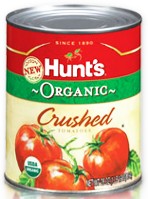 BPA laced "organic" tomatoes from Hunt's. This should be no surprise since Hunt's is now a division of the bio-technology powerhouse, ConAgra.
BPA laced "organic" tomatoes from Hunt's. This should be no surprise since Hunt's is now a division of the bio-technology powerhouse, ConAgra.
Those who are knowledgeable about plastic containers and the dozens of toxins that they leach (e.g. antimony and BPA) will often choose canned foods as a healthier alternative. However, aluminum cans, and aluminum water bottles have a secret plastic inner lining. This is because aluminum is known for reacting with either acids or alkalies, and aluminum combines with whatever it reacts to. If no plastic liner were present, people would be getting massive amounts of aluminum in their diets through metal food and drink containers. The plastic liners contain bisphenol-A in practically every case, including the organic options. This is not simply restricted to aluminum drink cans, but it branches out to all aluminum cans, including those which are used to can foods. The baked beans, soups, and canned vegetables found at retailers all have it.
Studies testing for the presence of BPA found that it was higher in food containers than soft drink cans. It is presumed that this is because canned foods are processed at much higher temperatures. There is only one brand that is currently claiming to use BPA-free cans, Eden Organic Baked Beans. However, the company still uses BPA for its canned tomato products. Some companies claim that their use of BPA is currently unavoidable for some products. However, there are other options that they could explore, such as glass containers, bees wax coatings, and more resilient metals. Most people would gladly pay a few cents more for alternative containers, if it ensured that their foods and drinks were pure.
The situation is sadly ironic, given that people are buying aluminum cans as a safer option to plastic bottles. It is important that health conscious people are made aware of this, so that they may make informed decisions. Due to the great aluminum lie, there are currently very few companies offering BPA-free cans. The food industry is exploiting our ignorance.
Completely avoiding BPA can be difficult, but it can be done. Avoidance is especially important for pregnant women, infants, and young children. Avoiding BPA means avoiding all aluminum cans, and hard, clear plastics. When buying plastic containers, use companies which pledge to never use plastics containing BPA, such as Ziplock. Buy foods fresh or frozen, whenever possible, because the foods are usually more nutritious, and the different packaging will eliminate plastic toxins such as BPA.
Related Articles
Your Metal Drinking Bottle Is Probably A Toxic Plastic Bottle In Disguise
Sanitary Tampons and Pads: How Their Dioxins Are Leading To The Endometriosis Epidemic
Bio-identical Hormones are Neither Safe nor Identical
Why Puberty Is Occurring In Seven and Eight Year Old Girls
Soy is Unfit for Human Consumption
Why We Bought A Bread Maker, and Why You Definitely Should Too
Juicing: The Hormone Regulator
How Some Gyms Are Very Dangerous To Health and How They Might Even Eventually Kill You
